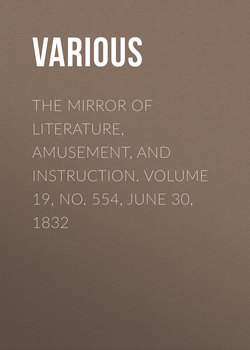Читать книгу The Mirror of Literature, Amusement, and Instruction. Volume 19, No. 554, June 30, 1832 - Various - Страница 4
SPIRIT OF THE PUBLIC JOURNALS
ОглавлениеCLAVERING'S AUTO-BIOGRAPHY
Containing opinions, characters, &c. of his Cotemporaries
Shelley had some excellent qualities: I attribute his eccentricities to a spice of insanity. He often wrote unintelligibly;—sometimes in short lyrics, beautifully. The ashes of him and Keats sleep together in the Protestant chapel at Rome. I am resolved once more to visit Lirici, where the funeral pile of his relics were lighted. I am never so happy as when I am travelling on the Continent; the mere change of air, and locomotion, gives me vigour. I saw old Sir William Wraxall at Dover, a few days before he died, and meant to have accompanied him to Paris. He was still full of anecdote, to which it was necessary to listen with caution; but his information was often curious and valuable. He was one of our oldest litterateurs.
Some years ago I met Sismondi: I could not agree with his ULTRA-LIBERAL politics! He has married an English lady, but does not seem to love the English. He himself once suffered from excessive revolutionism, and was condemned to death by it when young, about 1794, in the reign of terror, when Monsieur Raville and others were shot at Geneva. One would have thought that this would have made a convert of him in favour of legitimate governments. But I forget: he does not call them legitimate! He is a thick man, of middle height, with strong features, sallow, with weak eyes, rapid and rather indistinct in his articulation, with a character of great generosity and kindness; but not very tolerant to others in political thinking.
About 1802, strange lawyers perched upon the judgment-seat. Law, Pepper, Arden, and John Mitford! The little Pepper once took it into his head to review a cavalry regiment of fencibles, when he was Master of the Rolls. An unruly horse of one of the officers got head in a charge, and nearly ran over the affrighted judge. I was on the field, saw it all; and heard the small, staring man's terrible shriek! He swore that nothing should ever make him go soldiering again! He could not recollect his law-cases for a fortnight to come! He had some fun about him, and was always crying out, "Ne sutor ultra crepidam, ne sutor ultra crepidam." and indeed he looked like a shoemaker. A bowel-complaint carried him off. Perhaps it was the fright!
A certain learned theological bishop of that fraternity, a warm controversialist, long since dead, was of an amorous disposition. One day, being left alone with a pretty young lady, he began to be rude to her; she knocked off his prelated wig, and stamped it under her foot. At that time the footman entered, and all was confusion! The girl was in tears; the bishop's pate was bald. The footman was left to wonder! Some squibs appeared in the papers of the day, which few understood. I wrote a piquant epigram, which I will not revive. Old Thurlow, who was the prelate's friend and patron, laughed outright, and clapped me on the back when I dined with him a few days afterwards.
I have been more than once in company with Washington Irving, a most amiable man and great genius, but not lively in conversation. The engraved portraits I have seen of him are not very like him. He frequented the reading-room of Galignani at Paris, and seemed to have some literary connexions with him. There I saw Captain Medwin, the author of the book called Lord Byron's Conversations, which I believe to have been accurately reported. He was with his friend Grattan, the author of High-ways and Bye-ways. I was not personally acquainted with either of them. Grattan's flat nose is somewhat concealed in the print given of him in Colburn's Magazine, where this author, of course, makes a distinguished figure.
The late Professor Pictet, of Geneva, who had spent some of his early days in England, and was very fond of it, told me some curious anecdotes of his countryman De Lolme, whose book on the English constitution is much more commended than it deserves. He once endeavoured to set up a rival Journal to Old Swinton's Courrier de l'Europe, but his absurd denial of Rodney's victory ruined the project. De Vergennes, the French minister, patronized it. Brissot was connected with Swinton in the above-named Journal. One of Swinton's sons holds a high situation in the British Government in India:—another commanded a ship in the Company's service. Old Swinton was a Scotch jacobite, and forfeited.
